
The Ministry of Administration
by Anne-Marie Welsh
05/06/2024
“I am a firm believer that the priests who work at St. Mark Catholic Center should have pastoral experience when possible,” Bishop Lawrence Persico says. In an effort to foster understanding about this approach, Faith magazine interviewed the five priests (not counting the bishop, who is, of course, the pastor of St. Peter Cathedral, aided by Father Michael Ferrick, rector) who currently hold key administrative positions at St. Mark Catholic Center. Four of them also are pastors. Each has followed a different path, but has come to embrace the role he has behind the scenes in the ministry of administration.
FATHER NICHOLAS ROUCH
• Vicar general for the Diocese of Erie
• Pastor, St. Julia Parish, Erie
• Acting director, Office of Clergy Personnel
Father Nicholas Rouch never planned on working in administration.
As acting director of the Office of Clergy Personnel, he is in a good position to point out that, in general, few priests today have a single, full-time assignment.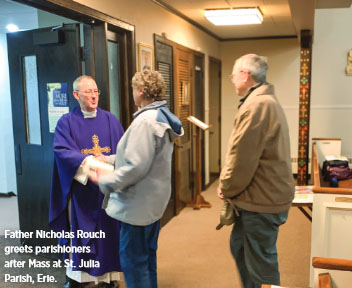 “I’m grateful that our younger guys seem to embrace that,” he says. His own path began with a three-year assignment in a parish before becoming a teacher at Elk County Catholic High School, where he also managed campus ministry.
“I’m grateful that our younger guys seem to embrace that,” he says. His own path began with a three-year assignment in a parish before becoming a teacher at Elk County Catholic High School, where he also managed campus ministry.
“It was a steep learning curve at first,” he says. “But I wanted to be the priest for these students, not just a teacher. During the years I was there, it got progressively better.”
He later taught theology and worked in campus ministry at Gannon University. Soon, he was asked to simultaneously become vice rector at St. Mark Seminary. And then a major twist: Due to the untimely death of Father Charles Drexler, Father Rouch, still in his early 30s, was named chaplain of the university.
“Most of the work as chaplain was pastoral, interacting with students and their sacramental needs,” he says. “But there was a staff to oversee, and I sat in on the president’s weekly Cabinet meetings. So that was my first introduction to serious administrative work.” Quickly settling into the role, he remembers the assignments as a great mix.
“It stretched me,” he admits, “but I was thrilled to be doing that kind of work. I was very much engaged in it.”
After earning his doctorate in sacred theology in Rome, Father Rouch returned to Gannon administration before being named vicar for education, overseeing the Catholic Schools Office. He led the major restructuring plan for schools in the diocese in 2015.
When the new position of superintendent of schools was filled by a layperson, Bishop Persico appointed Father Rouch vicar for the Office of Clergy, another challenging role in light of pastoral planning and parish restructuring.
And then came another twist: As a result of then-Msgr. Edward Lohse becoming bishop of Kalamazoo, Michigan, Father Rouch was named vicar general for the diocese, assisting the bishop in almost every aspect of administration and pastoral care.
With the new title came the pastorate of St. Julia Parish in Millcreek.
“Becoming a pastor has greatly enriched my life,” he says. “There is a joy in walking together with people. I think preaching is important to the People of God, and it’s important to me, personally. So, it’s been a great source of daily prayer and study.”
FATHER CHRISTOPHER SINGER
• Chancellor
• Director, Office for the Protection of Children and Youth
• Master of Ceremonies
• House confessor, St. Mark Seminary
There was nothing out of the ordinary about Father Christopher Singer’s first priestly assignment as a parochial vicar at St. George Parish in Erie.
“There was no school system at that time, so I was very involved with the parish school,” he says, remembering his five years at St. George with great fondness.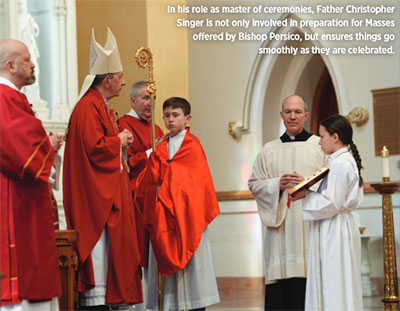 Then one day, after finishing his hospital rounds, he got a phone call and found himself in the bishop’s office within the hour, discussing the possibility of studying canon law.
Then one day, after finishing his hospital rounds, he got a phone call and found himself in the bishop’s office within the hour, discussing the possibility of studying canon law.
“I did not see that coming at all, but I was happy to go and study,” he says, like many canon lawyers, not completely aware of what that might mean down the road. Two years later, as he was preparing to graduate, he learned that the diocesan chancellor, then-Father Edward Lohse, had been assigned to work for the Congregation for Clergy in Rome. Suddenly, Father Singer was coming home as the newly named chancellor for the diocese.
He enjoyed being in residence at Holy Rosary Parish, Erie, for nearly a decade, connected to the parish but focused on his duties as chancellor and as the master of ceremonies (MC) for Bishop Persico. As MC, he handles everything from arrangements for all of the Masses the bishop celebrates in parishes throughout the diocese to the logistics for major events such as ordinations, which require several weeks of preparation.
When then-Msgr. Lohse became a bishop, Father Singer inherited some of the responsibilities his colleague had handled. This means that Father Singer is now not only chancellor, but also director of the Office for Child Protection and Youth. Both the Office for Divine Worship and the Archives also fall under the umbrella of his work, and he oversees all canonical writing done on behalf of the diocese. Father Singer also is responsible for hospital chaplaincies, often taking on visits to the hospital himself.
“It’s all quite complex,” he says with his trademark smile, calling it an honor to work on behalf of the clergy in support of the bishop.
“I am fortunate the Chancery has a good foundation, and I rely on my colleagues a great deal," he says.
FATHER MARC STOCKTON
• Judicial vicar
• Pastor, St. Boniface Parish, Hammett
Father Marc Stockton entered the seminary right after high school.
“The image I had, and that I think probably most guys have when they enter the seminary, was parish priesthood,” says Father Stockton, who is pastor at St. Boniface Parish in Hammett, about nine miles from downtown Erie.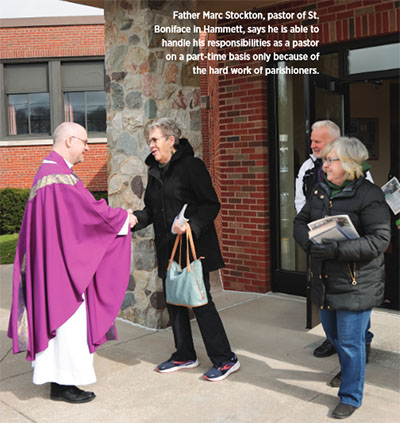 Ordained in 2002, he served as a parochial vicar at St. Joseph Parish in Sharon for three years, but soon had his first dual assignment as parochial vicar at St. Peter Cathedral and faculty member at Cathedral Preparatory School in Erie.
Ordained in 2002, he served as a parochial vicar at St. Joseph Parish in Sharon for three years, but soon had his first dual assignment as parochial vicar at St. Peter Cathedral and faculty member at Cathedral Preparatory School in Erie.
He was later assigned to St. Bartholomew Parish in Sharpsville, while serving as president of the Shenango Valley Catholic School System. All of that happened before 2013, when Bishop Persico asked him if he would be willing to study canon law.
As a quick overview for those unfamiliar with the study and practice of canon law, Pope St. John Paul II signed a revised Code of Canon Law into effect in 1983. Written in Latin, but now translated into many languages, it consists of seven books featuring 1,752 canons, or norms. Canon law covers everything from guidelines for the administration of sacraments to worship norms to how church properties are handled. A major change in the latest version is its approach to the church as the People of God rather than an institution.
Upon graduation, Father Stockton was named judicial vicar for the Diocese of Erie, overseeing the work of the Marriage Tribunal.
“I am comfortable and very willing to serve as judicial vicar,” he says. But he also is pleased to have been named pastor of St. Boniface at the same time.
“I do have to be careful about making distinctions in my approach to work in the Tribunal as opposed to the parish,” Father Stockton says. “In my Tribunal work, I have to be neutral, relying solely on legally established facts, whereas in 15the parish, I am there to be pastorally present and supportive.”
St. Boniface Parish is his third pastorate, but he is the parish’s first part-time pastor.
“Parishioners know and understand my availability is limited. They are willing to work with the reality,” he says, noting that every priest has different kinds of challenges in his work. In a perfect world, would he prefer to be in a parish full time?
“Of course you can always have this vision of what a vibrant parish should be, if you only had the time,” he says. “We’re working on it. The parishioners work hard, really taking ownership of their parish. They want to see it grow and prosper. I am fortunate that we have great people."
FATHER JUSTIN PINO
• Pastor, St. Leo Parish, Ridgway
• Diocesan archivist/historian
• Vice president of Catholic mission, Elk County Catholic School System
“I felt the call to be involved with history before I felt the call to the priesthood,” says Father Justin Pino, pastor at St. Leo Parish in Ridgway and archivist for the Diocese of Erie. That would have been at a very young age, as he distinctly remembers his call to the priesthood “like a lightning strike” soon after he made his first Communion in second grade.
“I was a nerd,” he admits. “Everyone else was playing baseball outside while I was reading the Encyclopedia Britannica, memorizing the names of presidents in order. But I’ve always believed we can’t understand the present or where we’re going without knowing the past.” When people asked him what he wanted to be when he grew up, his reply was, “Father Indiana Jones.”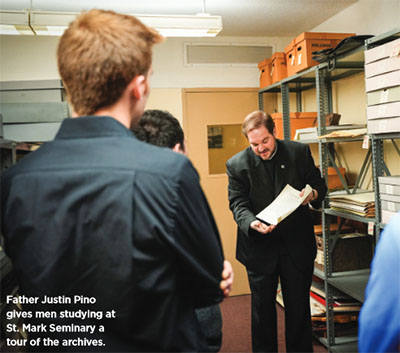 So it’s clear, even in casual conversation, that Father Pino has a unique ability to paint a colorful picture, to bring the past to life.
So it’s clear, even in casual conversation, that Father Pino has a unique ability to paint a colorful picture, to bring the past to life.
He never experienced tension in his dual path.
“It has always been a parallel companionship,” he says. “I have a much better appreciation of the church when I look at life and ministry through the lens of history.”
At one point, he volunteered to teach church history at Venango Catholic High School.
“My students always told me they appreciated hearing our full history,” Father Pino says. “I tried to add a little more color to the portrait. We can celebrate Easter, but we can’t ignore the bloody, terrible experience of Good Friday. History is factual, there’s nothing to hide. It happened.”
That perspective is woven into his preaching as well.
“We can’t pick and choose what we want from Scripture,” he points out. “St. Paul says what he says, inconvenient or not. That is what it means to follow Christ.”
Father Pino is comfortable juggling his assignments and interests.
“At one point, I had two parishes, the archives and I was teaching three classes,” he says. Unique to his situation is that he has to travel just over 200 miles from Oil City to Erie and back one day a week to work in the archives. It has taken him almost 10 years to go through everything, inventorying file by file, page by page, scanning and digitizing.
He loves being able to read through the files of his predecessors whose photos line the wall by his desk.
“Sometimes, with technology, I can finish a piece of work one of them began a century ago,” he says. “It gives me such a spark to be able to complete that.”
With all this enthusiasm about history, it’s easy to forget that this is a one-day-a-week responsibility for Father Pino.
“I’ve always integrated history into my ministry and homilies,” Father Pino says. “St. Leo’s is having its 150th anniversary, so there are doses of history every day. Plus, because of my role at St. Mark Center, I am able to help my people understand the importance of the work that is done in Erie. I’m able to see and witness to the fact that the work of the diocese is done with a pastoral heart.”
He also has learned to rely on his parish staff. “My office manager is a godsend,” he says. “The staff is very patient.”
In a final thought demonstrating how well Father Pino has integrated his responsibilities, he tells the story of attending the rededication of St. Peter Cathedral in Erie when he was 12 years old.
“My mother let me skip school, and when (the Archdiocese of New York’s) John Cardinal O’Connor gave his homily, he said, ‘You are the church. It’s not this building. You are the church.’ I looked at my mom and said, ‘He just reaffirmed what I’ve been thinking. I didn’t know it at the time, but that’s the theology of church. But I did know that was the ministerial priesthood I wanted to emulate. And you know, that’s what the archives are. Each page, each photograph is the church. It is the living memory of how people shared their love of Jesus Christ. That’s why I have to preserve it. We can’t lose that.”
FATHER MATTHEW KUJAWINSKI
• Pastor, Our Lady of Mercy Parish, Harborcreek
• Director, Office for Divine Worship
When Father Matt Kujawinski became a pastor in 2008, he was the first to receive that responsibility just five years after ordination. With today’s changing landscape, most are becoming pastors even earlier.
His entry into administration differs from the others currently serving at St. Mark Center in that Father Kujawiski had a number of parish assignments under his belt, including Our Lady of Peace and St. Jude the Apostle, both in Erie, as well as pastorates at St. Bartholomew in Sharpsville, St. Agatha and St. Mary of Grace parishes in Meadville, and Immaculate Heart of Mary in Mercer before his most recent assignment as pastor of Our Lady of Mercy in Harborcreek. 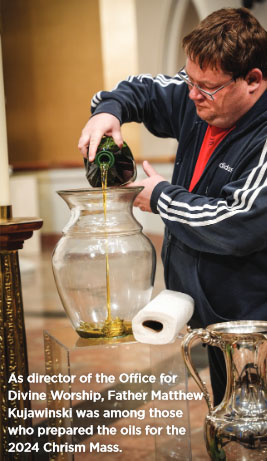 His work in administration was a serious baptism by fire.
His work in administration was a serious baptism by fire.
“I came into the Office for Divine Worship in 2020, just as COVID arrived,” he says. “So that was an adventure.” Lest anyone has forgotten, almost every aspect of worship had to be adjusted and re-adjusted for almost two years as a result of the pandemic.
Today, Father Kujawinski is officially in the office two afternoons a week, although sometimes more. And of course, there are the emails and phone calls throughout the week. This summer, he will begin work on his doctorate in liturgical catechesis through The Catholic University of America. Designed for non-traditional students, each semester will be 13 weeks online and two in person.
Looking forward to both the credentials and the connections, Father Kujawinski also recognizes the demands he is about to face.
“I spoke to a former professor as I was gathering recommendations,” he says. “Recognizing I’ve been out of school for more than two decades, he told me during the first semester, I’ll be overwhelmed. But then he said to just get through it. Get through that first semester and you’ll be OK.”
His work in worship has two significant purposes. One, to provide assistance to the bishop for all events that include prayer, either creating or reviewing what’s planned. Secondly, the office is a support to parishes, pastors and liturgical ministers, offering training and catechesis. As a pastor, Father Kujawinski understands and tries to make adjustments to keep things practical at the local level.
“The rules are important,” he says. “You can attend a Catholic Mass anywhere in the world and in any language, and basically know what’s happening because of the rules. But the last canon in the Code of Canon Law says the supreme law of the church is the salvation of souls. I had a professor once who said that’s what we need to concentrate on.”
-
